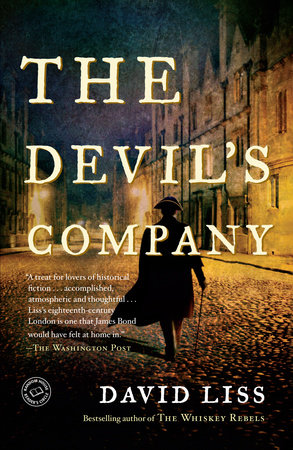
I enjoy reading books the most when I’m learning something from them. History or historical fiction that unravels the mysteries of the past. Science fiction that introduces mind-bending new ideas or clever twists on older ones. And mystery and suspense fiction that helps me understand how people live their lives in unfamiliar places or circumstances. Historical mysteries and thrillers sometimes offer a combination of these advantages, as do the first two books in David Liss’ four-book Benjamin Weaver series. They spotlight the tumultuous years early in the 18th century when England was in the throes of political and economic turmoil. Little more than half a century had passed since revolutionaries had cut off the head of their king. But the third Benjamin Weaver novel, The Devil’s Company, sadly goes off the track. It’s a story of early industrial espionage, but it doesn’t quite work.
Early industrial espionage in the era of the cotton trade
The story is based on two themes that preoccupied British officials throughout the 18th and 19th centuries: the debate over free trade and the conflict between the British East India Company and Parliament. In The Devil’s Company, “thieftaker” (private detective) Benjamin Weaver tangles with the formidable men who manage the century-old monopoly. In telling the tale, Liss brings to light the company’s excesses, its fractious relationship with His Majesty’s Government, and the competition the company faced from France and the Netherlands. Sadly, though, the author frames this picture in a convoluted story that’s impossible to take seriously.
The Devil’s Company (Benjamin Weaver #3) by David Liss (2009) 561 pages ★★★☆☆

Unlikely incidents and implausible coincidences
As you’ll be aware if you’ve read the earlier entries in this series, Benjamin Weaver is a celebrated former prizefighter and thief-turned-thieftaker. He is Jewish, though unobservant, a member of the Portuguese-Jewish community in London. He was raised by his uncle Moses, a prosperous trader in wines from the Iberian peninsula. Having pursued his vocation as an investigator for several years, he has gained a reputation in London for integrity as well as effectiveness. And it appears to be that reputation that has led a mysterious man named Cobb to force him into service in a nefarious plot to undermine the British East India Company. There ensues a mind-bogglingly confusing series of unlikely incidents and implausible coincidences involving a string of equally mysterious new characters. Though the novel might have been an interesting portrayal of early industrial espionage, it gets lost in the action.
Too bad. The first two books were excellent.
About the author

David Liss (1966-) is the author of the four books in the Benjamin Weaver series. He “left his post-graduate studies of 18th Century British literature and unfinished dissertation to write full-time,” according to his entry in Wikipedia. He has been doing so since 2010. To date, Liss has written a dozen novels, mostly historical mysteries and thrillers, as well as short fiction and comic books.
For more reading
I’ve also reviewed the first two (much better) books in the Benjamin Weaver series:
- A Conspiracy of Paper (Financial skullduggery in 18th century England in this historical thriller)
- A Spectacle of Corruption (Rampant political corruption in 18th century England)
Be sure to check out Empire of Cotton: A Global History by Sven Beckert (Capitalism reexamined from an historical perspective).
You might also enjoy my posts:
- Top 10 historical mysteries and thrillers reviewed here
- 20 excellent standalone mysteries and thrillers
- Top 20 suspenseful detective novels
- Top 10 mystery and thriller series
- 5 top novels about private detectives
- 30 outstanding detective series from around the world
And you can always find my most popular reviews, and the most recent ones, plus a guide to this whole site, on the Home Page.


























